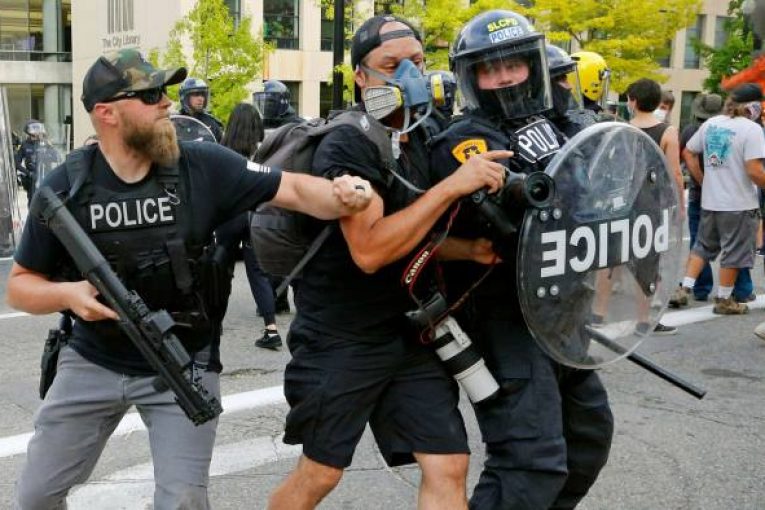

By Mary Magana
SACRAMENTO, CA – Reporters have been arrested and even injured at the hands of police over the past year during police brutality protests across the California, according to members of the news media, and now Gov. Newsom is being urged to sign legislation, SB 98, to protect members of the press from law enforcement.
In California, officers are given the right by law to restrict areas from the public in order to ensure the public’s safety from scenes including floods, fires, earthquakes, and accidents. They are also given the right to arrest anyone who remains at the restricted scene after being evacuated.
However, the Los Angeles Times notes that California law also allows news organizations and reporters to enter restricted scenes in order to report on news events to inform the public. In disaster scenes, reporters are able to communicate with the public and provide information that can impact residents. Additionally, the law gives reporters access to respond to riots, protests, and other civil disturbances.
The LA Times Editorial Board states that despite the law authorizing reporters to remain on the scenes of a protest, reporters have faced detention, arrest, and injuries for remaining on the scene after the public was dismissed.
The LA Times explains that reporters have faced instances where police were directly targeting journalists and theorize this could be due to “frustration over news reporting critical of their  actions.”
actions.”
Ambiguity in a different California law, which excludes the mentioning of reporters, deems it illegal for anyone to remain at the scene of any protest and assembly after police have ordered the public to disperse. The ambiguity between both California laws creates an uncertainty and inconsistency on the role of reporters in protest scenes.
In the past, Gov. Newsom was presented a bill which clarified reporters’ place at protest scenes, but he vetoed the bill with the explanation that it could unwittingly give access to “fringe groups” to enter restricted areas. Newsom promised the public that his police advisors were developing recommendations that aimed to protect journalists.
The LA Times said this past year indicates these recommendations have not met the expectations. The editorial board notes that police have continued to detain and cause physical injuries to reporters and their security continues to be under threat.
SB 98 was recently introduced with the attempt to protect the security of journalists. It restates the current law in place but specifies that the law also applies to protest scenes and not just limited to disaster scenes.
The LA Times suggests that vetoing the bill a second time could inadvertently produce a signal to police officers that they are within their rights to arrest reporters at restricted scenes, including protests.
The editorial board argues that signing the bill allows the police to recognize reporters protected constitutional role at protest scenes, even if their writings, sayings, recordings, or social media posts don’t align with the police.
Considering Newsom’s recent recall election, the LA Times suggests signing the bill can strengthen the relationship Newsom has with the media, especially considering many news outlets endorsed the governor in the recall.
As expressed by the LA Times editorial board, SB 98 not only protects reporters from police abuse, but also ensures that reporters are able to continue informing California residents about important issues of the day.


But here’s the problem, rioters who aren’t press try to represent themselves as members of the press.
https://i.ytimg.com/vi/INlWyj7AnQ0/maxresdefault.jpg
Does this protection also cover Andy Ngo? Should it?
Also, in a world where a “blogger” is considered press, and “everyone’s a blogger”, how prevalent will press “I.D”‘s be, and at one point are press I.D.’s going to be used as cover for protestors who aren’t keeping the peace?
I’d ask these guys:
https://www.youtube.com/watch?v=fv_Zy9qz4j8
Exactly, if you own a computer you’re a member of the “press”.
From the law: “A duly authorized representative of any news service, online news service, newspaper, or radio or television station or network that is in a closed area described in this section shall not be cited for the failure to disperse, a violation of a curfew,”
Notice it only covers for failure to disperse or curfew